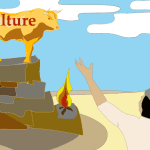In Destroyer of the Gods, Larry Hurtado reminds us that “in the Roman era the sexual use of children, including young adolescents and also younger children, was widely tolerated and even celebrated lyrically by some pagan writers of the day, such as Juvenal, Petronius, Horace, Strato, Lucian, and Philostratus.” Greek had a “whole vocabulary” that carried “no connotation of disapproval” (167).
He cites the work of John Martens who “has shown that early Christian condemnation of the practice even led to what appears to be a distinctive Christian terminology coined to refer to it. It appears that Christians invented the term paidophthoreo and the noun paidophthoros used in their condemnations of the practice, and Martens persuasively contends that these terms should be rendered respectively as ‘to sexually abuse/corrupt children” and “one who sexually abuses/corrupts children.’ These terms reflect an emphatic Christian rejection of ‘pederasty,’ relabeling it as ‘child corruption/abuse’” (167).
The new Christian terms appear as early as the Didache and the Epistle of Barnabas, and are found in Justin, Tatian, Theophilus, Clement and Origen. These are “not simply ancient Christian propaganda against outsiders. They also reflect a collective effort to shape Christian behavior over against the practices tolerated in the wilder culture” (168).
When secularists condemn Christians for turning a blind eye to sexual abuse, they’re applying a standard they learned from the church.















